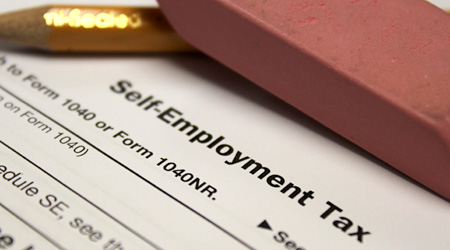4 Tax Deductions for Self-Employed Freelancers and Small Busines

When you start your own business, it seems like there's always yet another thing you need to spend money on to keep it running smoothly. Fortunately, most of them will be tax deductible. The IRS defines a deductible expense as something that is ordinary and necessary - in other words, it must be something you need to run the business and that is commonly used by others in your line of work. For example, a mobile dog groomer might see a new washtub as ordinary and necessary, but it would raise some eyebrows if a graphic designer put a bathtub on the company credit card. Many expenses are pretty common to most businesses, though, such as office supplies, paper, mailing expenses, advertising, or mileage.
You might think it's cumbersome to log every single expense, down to your paper clips. But every little bit adds up and can save you big bucks in the long run. Still not convinced? Think of it this way - would you pass by a $20 bill on the sidewalk? If you're looking to automate the process of small business accounting, check out Outright, a great online tool that will tie into your accounts and track your expenses for you.
Below are four common types of tax deductions that the self-employed, small business owner or entrepreneur might encounter. While not all will apply to everyone, it's a good idea to examine each of your purchases for business purposes over the year and make sure you have categorized them correctly. Also, keep in mind that while an expense may be legitimately in a certain category, the IRS has its own ideas about how much is considered excessive - that means no diamond-studded collars for your dog grooming business.
1. Advertising
Almost all forms of advertising will be deductible. Flyers, website advertising, placing ads in magazines - basically, anything that you did to attract more business is considered advertising. Table fees or other small business expenses incurred when promoting your business at trade shows can be deducted as an advertising expense. However, any travel costs to and from trade shows or to meet with clients to pitch are treated separately.
2. Website expenses
If you've got a website to promote or run your business, everything associated with that website is deductible. This includes hosting or domain name fees, software, web designer commissions, or licensing fees for images to use on your site. As long as these are for the exclusive benefit of the business, they're fully deductible.
3. Home office expenses
If you have a dedicated home office for your business, or use some other part of your property for business purposes (such as storage), you can take the home office deduction. The home office deduction covers deducting rent, utilities, or home improvements and repairs to your home - your deduction is calculated basically by determining what percentage of your home the office comprises, and then multiplying that by the home's expenses for the year. It's a great tax break if you do freelance work for side income and/or work exclusively from home.
Where it can get a little hairy is determining what portion of expenses like Internet or phone can be deducted. If your bill is combined with other things such as cable TV that aren't used for work, you can only deduct the portion of the bill that's for services relevant to your business. It's a good idea to have a completely separate plan for your business phone if you have a cell phone, or to have a separate account for any landlines, to ensure you aren't deducting any personal expenses accidentally.
4. Business travel
Any travel, whether by car or not, which you do to get new accounts, provide service to customers, meet with existing clients, or otherwise do solely for the purpose of the business is deductible. Taxi fares, baggage charges, toll fees, parking costs, and other travel-associated items are also deductible. Special rules apply for meals on the road and any entertainment expenses (for clients, not yourself) as you can only deduct 50% of those costs. Presumably, you and your clients would otherwise be eating anyway, so you can't deduct the full amount.
If you're driving your own car, the easiest method to get a deduction for this usage is to keep a mileage log. The IRS has set a rate of 50 cents per mile for 2010 (one would hope you get more than 6 miles to the gallon, so it well covers gas costs). This doesn't include any miles you drive getting from home to the office, if you have one. For example, if you drive 5 miles to the office and then drive 6 miles from the office to a client, 6 miles back to the office, and 5 miles home, you can deduct 12 miles for the day. Keeping a mileage log is the easiest way to both keep your personal and business driving separate, and also to have a really good paper trail for yourself if you're audited. Even if you don't need to drive a lot for your business, you can still claim mileage for trips to the post office or office supply store. A few miles now and then can really add up by the end of the year.







